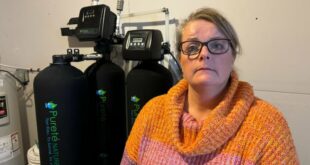Federal insurance program for people in high-risk areas could help future climate survivors

Before and after Fiona: How a single storm changed the landscape of a Newfoundland town
Post-tropical storm Fiona destroyed more than 100 homes in Port aux Basques in 2022. Here’s what it looks like one year later.
Peggy Savery plays cards with her husband Lloyd at her new table in a sun-drenched kitchen. The family is still settling into their new home in Port aux Basques, bought and furnished by a hodgepodge of donations and disaster relief funding.
Their old house, the one destroyed by a storm surge during post-tropical storm Fiona, was covered, she says, estimating the family paid their insurance company about $60,000 to protect their most valuable asset.
But when disaster struck last September, all of the Saverys' claims were denied; damage from seawater wasn't included in their premiums.
"They didn't give us a dime," she said.
The Saverys are among 102 households in Port aux Basques and surrounding communities that were destroyed by Fiona whose insurance companies refused to pay out for damages from the storm.
Most were left homeless, with nowhere to turn and forced to depend on government aid to rebuild their homes or buy again. The Newfoundland and Labrador government paid out $41 million to Fiona's victims after a lengthy application and assessment process to fill the void left by insurers.
Denise Pike Anderson was forced to downsize and move to nearby Cape Ray.
Had her insurance paid out, she would've been able to rebuild, she said. Instead, her company told her she needed special surge protection — something almost no insurers currently offer.
"The insurance [companies] should be grateful to the government," she said. "I really believe that we need stricter laws."
Ottawa to underwrite new flood program
About 1.5 million Canadians live in a flood plain or low-lying coastal community, according to the Insurance Bureau of Canada.
With increasing risk from climate change, a collection of insurance companies and the federal government are hammering out a deal to offer flood insurance to homeowners in those areas, says Craig Stewart, a vice-president with the bureau.

This is why insurance companies refused to pay for houses lost to Fiona
Newfoundlanders who lost their home to the most powerful storm to make landfall in Atlantic Canada say insurers didn’t pay out a cent when their homes were destroyed in September 2022. But an insurance expert says there’s a solution on the horizon for future flood victims.
"Insurance is designed for accidents, and when people live in flood plains or in low-lying coastal communities … we know they're going to flood at some point, and it's no longer an accident," Stewart told CBC News. "That's why insurance isn't a good fit, and why we've been pursuing another solution for those people."
The federal government will underwrite that insurance, with capped premiums available for people in at-risk areas, Stewart said.
"Right now we essentially have two solutions: we have government-backed disaster assistance, which is essentially free insurance paid for by the taxpayer, and then you've got an insurance market which won't cover those at high risk," he said. "Neither is optimal."
Fiona's wrath in Newfoundland prompted Ottawa to include storm surge coverage in its national flood program, he said, adding it's expected to roll out in 2025.
Peggy Savery, meanwhile, has been busy replenishing what the family lost, trucking in furniture from Stephenville and decorating with whatever she's salvaged from the rubble left by Fiona.
These days she's focused on the future, grateful her new home's previous owner offered the house to her family at a below-market price.
Without that act of kindness, she suspects they would have moved away.
"Had the insurance company done what they should have done, it never would have been an issue for us," she said.
"When you see the insurance companies raking in millions and billions of dollars and not paying out, it just doesn't seem fair that the government has to bail us out."
Download our free CBC News app to sign up for push alerts for CBC Newfoundland and Labrador. Click here to visit our landing page.
ABOUT THE AUTHOR
Reporter
Malone Mullin is a reporter in St. John's who previously worked in Vancouver and Toronto. News tip? Reach her at malone.mullin@cbc.ca.

Add some “good” to your morning and evening.
A variety of newsletters you'll love, delivered straight to you.
*****
Credit belongs to : www.cbc.ca
 MaharlikaNews | Canada Leading Online Filipino Newspaper Portal The No. 1 most engaged information website for Filipino – Canadian in Canada. MaharlikaNews.com received almost a quarter a million visitors in 2020.
MaharlikaNews | Canada Leading Online Filipino Newspaper Portal The No. 1 most engaged information website for Filipino – Canadian in Canada. MaharlikaNews.com received almost a quarter a million visitors in 2020.







